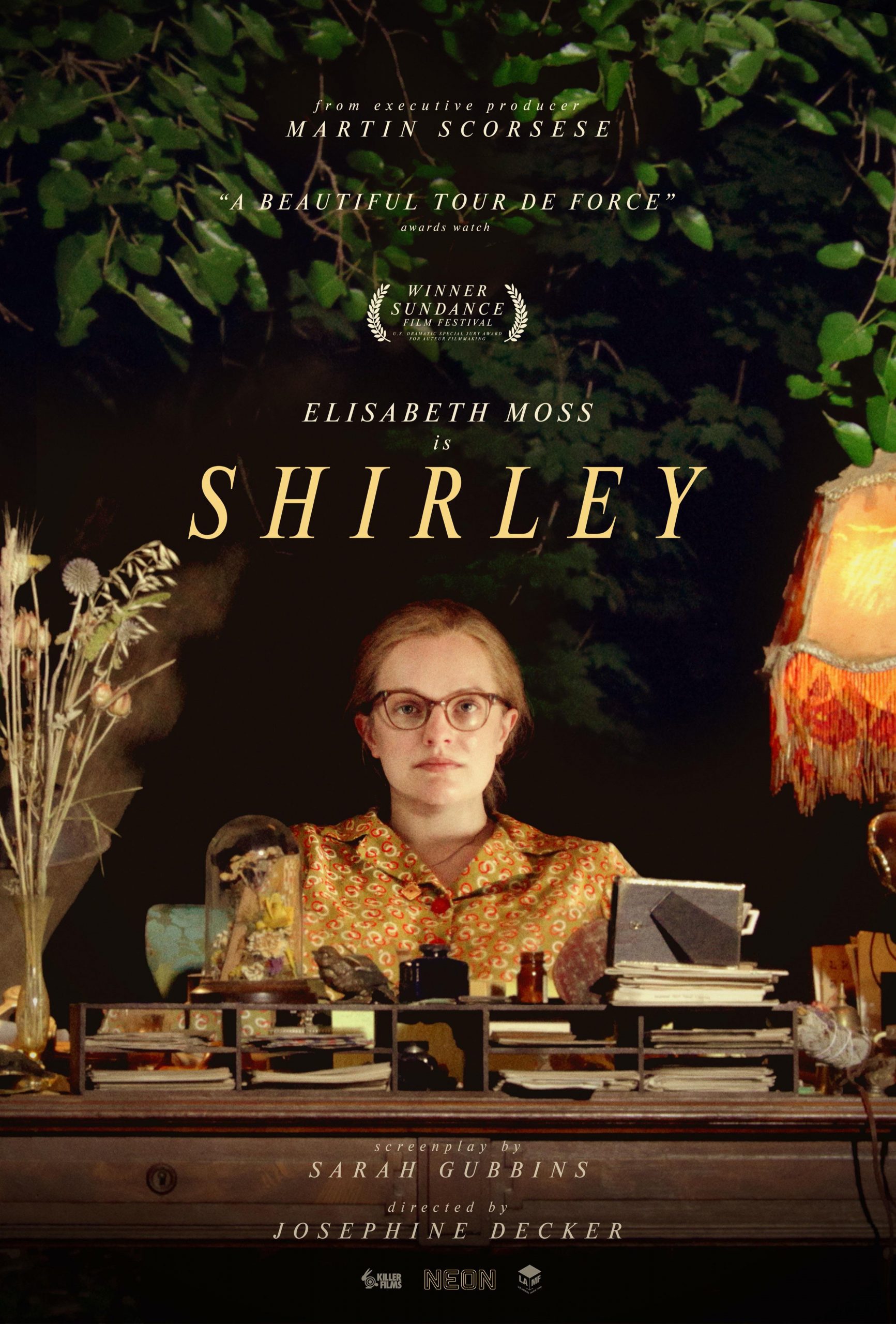
Shirley: Not a Biopic
More Videos
Published
4 years agoon
By
Kayla Bell
Like many horror fans, Shirley Jackson is one of my favorite writers of all time. I’ve read almost all of her books and short stories. One of the most interesting things about her writing is analyzing how her own life impacted her stories. Going into this movie, I thought that would be the major theme. Spoiler alert: Shirley wasn’t actually about Shirley Jackson, the real-life horror author. It’s a psychological drama that uses the names of Shirley Jackson, Stanley Hyman, and a few of her short stories. But was it still good?
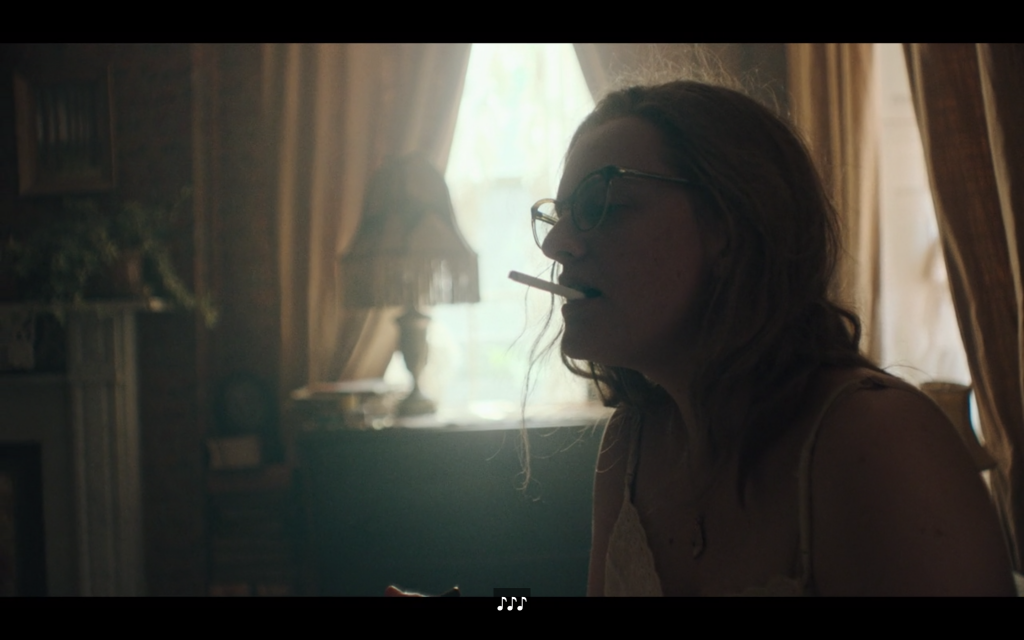
If it’s not a biopic, then what is it about?
The story portrayed in Shirley and the novel that it’s based on is completely fictional. The movie starts with a young couple, Fred and Rose, on a train to Bennington, Vermont. Fred is an academic, and has just gotten a job helping Professor Stanley Hyman with his research. The professor has offered for the couple to stay in his home. He is very warm and friendly, the life of the party. His wife, Shirley, on the other hand, is incredibly cold, rude, and very clearly depressed. Stanley asks Rose to basically become his housekeeper in exchange for free room and board. Pressured by her husband, Rose agrees. Soon, her husband and Stanley are gone all day at work and she is stuck in the house cleaning, cooking, and talking to Shirley. Fred is out late every night, advising the campus Shakespeare Society.
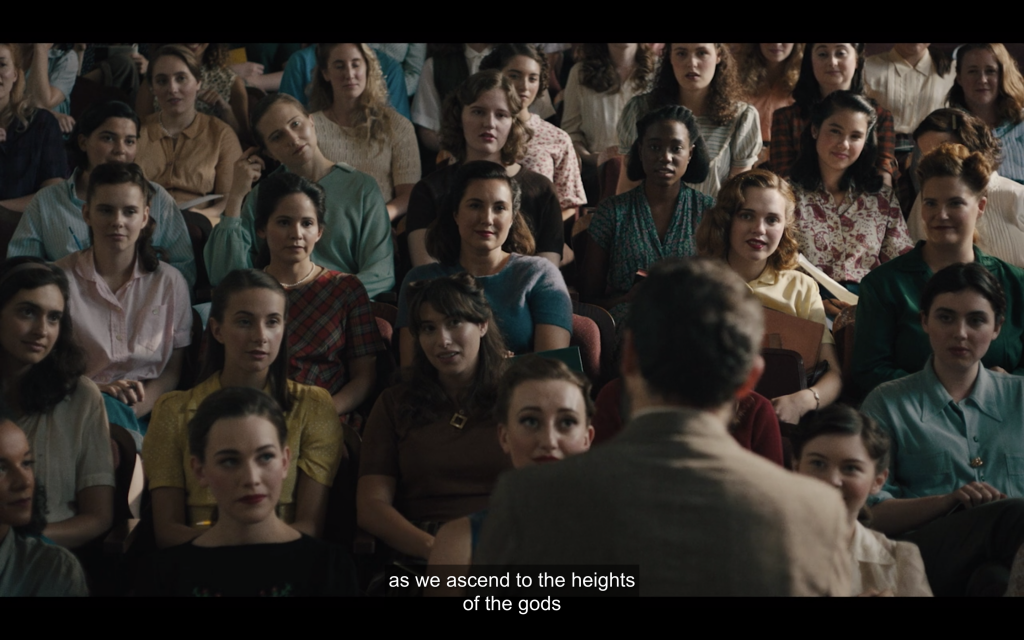
The two women start off with an antagonistic relationship (Shirley somehow guesses that Rose is pregnant, reveals it to everyone at the dinner table, and accuses Rose and Fred of having a shotgun wedding), but they soon grow close. Shirley is obsessed with the recent disappearance of a Bennington College student, and Rose agrees to help her investigate. This becomes the basis for Shirley’s new novel (you guessed it), Hangsaman.
As Shirley and Rose grow closer, Rose starts to realize how similar her own life is to the author’s. Both women are pretty much confined to the home while their husbands cheat on them with their undergraduate students. This is especially true towards the end of the movie, when Rose has her baby and must take care of the child on top of the house. The film culminates in Rose having a breakdown after Shirley reveals that there is no Shakespeare Society, and that Fred has just been using that as an excuse to sleep with his students.
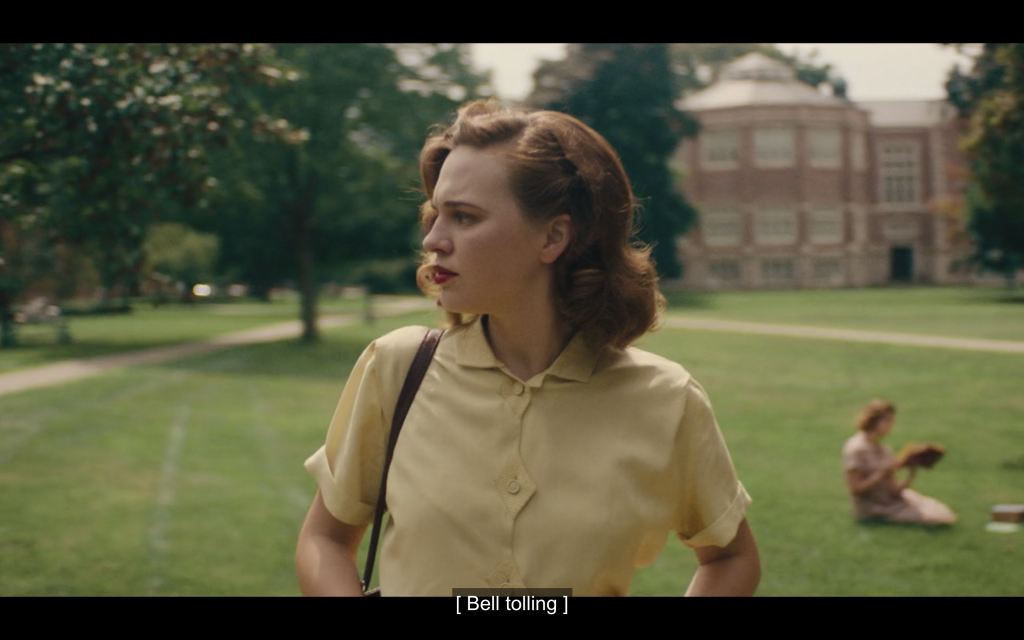
What the movie got right
This film has one of the best aesthetics I’ve ever seen. The cinematography perfectly captures a gothic vibe. I’m even using one of the screenshots I took as my computer background because it’s so creepy and beautiful. Building off of that, the soundtrack for this movie was incredible. Tamar-kali, the composer, did a fantastic job of setting the paranoid, sad, haunted tone of the film. The soundtrack really highlighted the characters’ difficult emotions. I will definitely be turning this playlist on the next time I’m writing gothic horror.
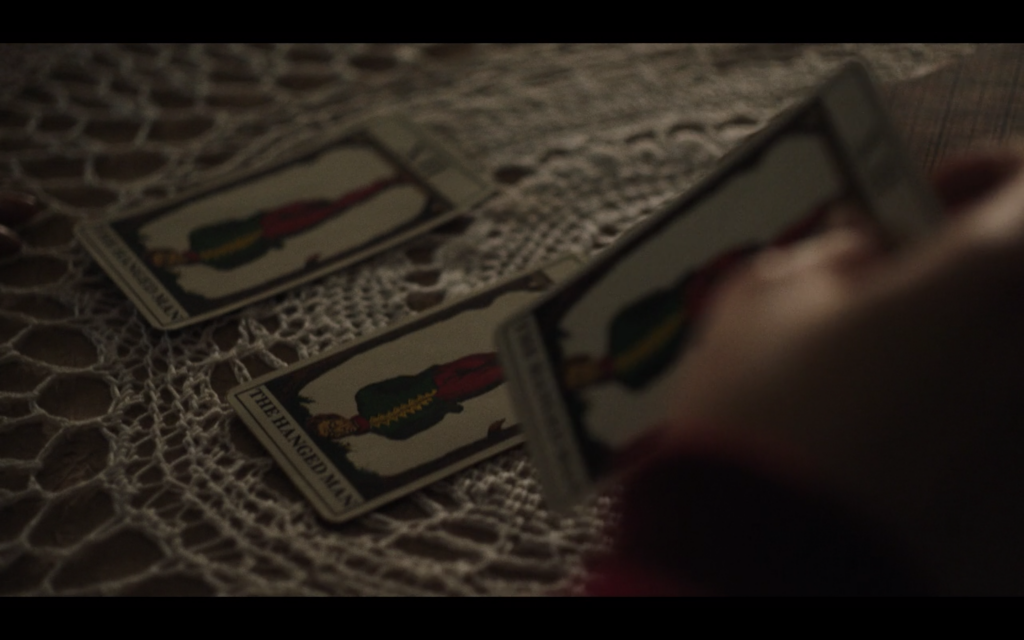
I also would be remiss if I didn’t talk about the performances. Every single actor in this film did such a great job. Odessa Young as Rose gave a really compelling performance of a character that could have ended up being quite boring. Elisabeth Moss was phenomenal in her portrayal of depression, agoraphobia, and dissatisfaction (although, to nitpick, she didn’t do a good impression of the author’s voice). The scenes where Shirley interacts with her husband are so nuanced and real. She was hard to watch, in a good way. Another standout was Michael Stuhlbarg as Stanley. He toed the line really well between being warm, manipulative, and predatory. All of the actors should get awards for this movie, in my opinion.
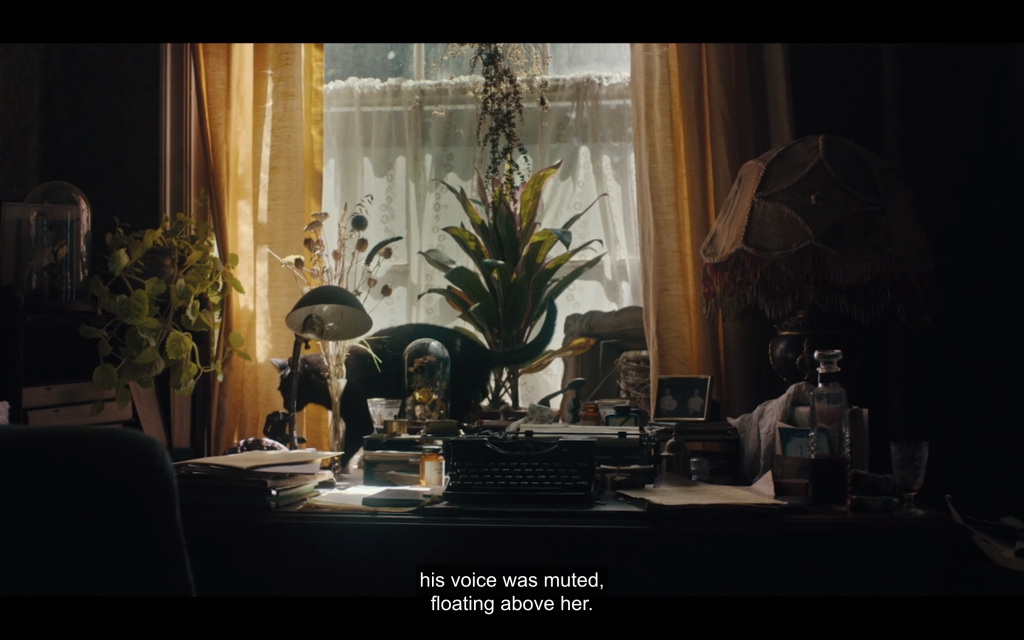
The themes in the film were fascinating. Ultimately, Shirley is about the horrors that women face in a patriarchal society, of how terrifying it is to remove yourself from the outside world, be forced to run a household by yourself, and still be invisible. This film is very claustrophobic and delves deep into the profound loneliness that these women feel. Further, it connects these feelings to the novel Hangsaman, which you should read. For that reason, I think Shirley is definitely worth watching.
Finally, there were a lot of fun easter eggs for us fans of Shirley Jackson’s work. Obviously, there are plenty of references to Hangsaman, from a stern Stanley determined to read and critique Shirley’s writing to a wild masquerade party around a bonfire. There’s also a scene featuring something no fan of We Have Always Lived in the Castle would miss: death-cap mushrooms.
What it got wrong
As the title states, this movie is not a biopic. So, I don’t fault the movie for not being true to life. However, I do think it’s interesting and important to talk about what Shirley Jackson’s life was actually like during the time the film takes place.
Shirley takes place in the late 1940s or early 1950s, after Jackson published her infamous short story The Lottery. The film portrays the author as a depressed recluse who is alone all day and obsessed with writing a novel based entirely on a real-life disappearance. In reality, Shirley Jackson’s life at the time was very different. I am by no means an expert on this woman’s life, but here are some facts that I do know about my favorite author.
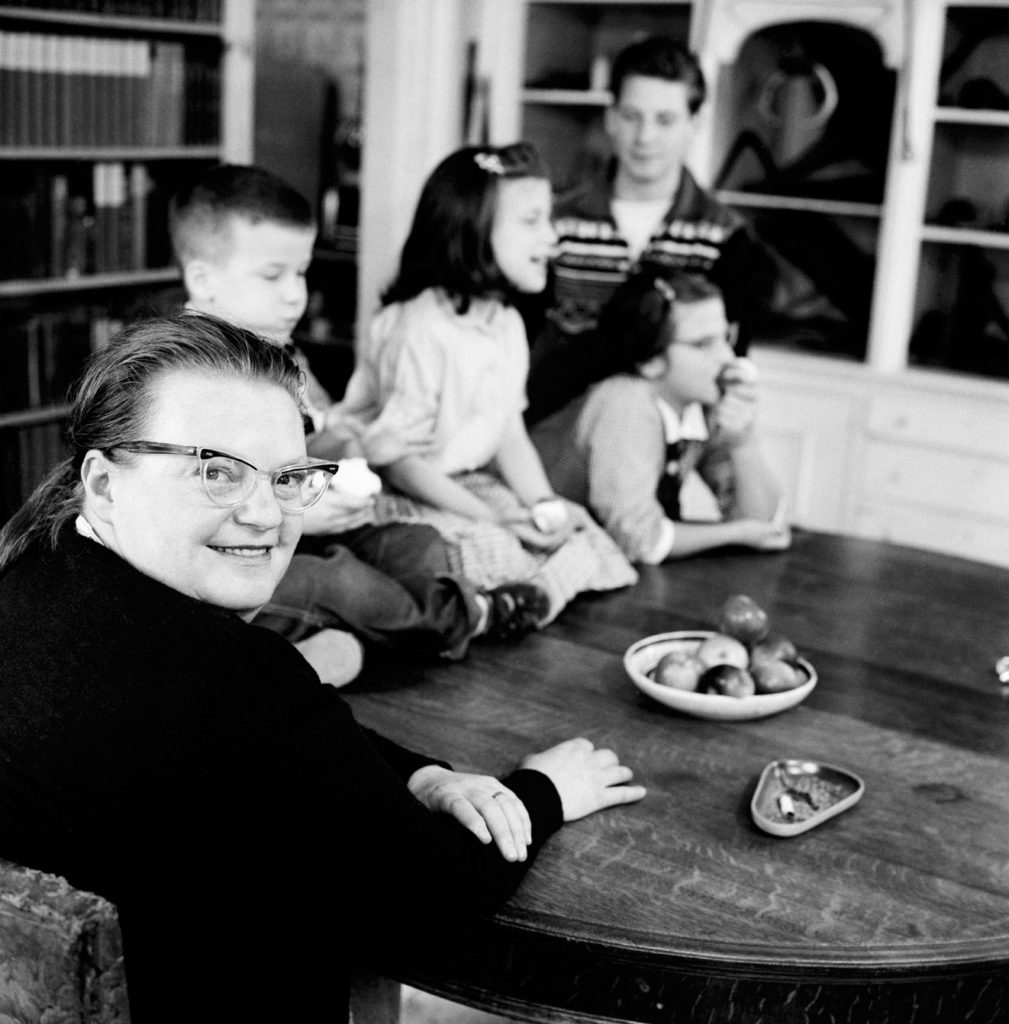
Jackson was actually raising four small children in suburban Connecticut during this time period. Obviously, I understand that there are legal issues that could have prevented the filmmakers from including Shirley and Stanley’s children. But, by most accounts, Shirley seemed like a fun, active mother. You can even read her own reflections on parenting in her popular memoirs Life Among the Savages and Raising Demons. According to her children, at the time the film takes place, the house was always full of play, visitors, and pets. I doubt that this real-life element would have contributed to the gothic, sad tone of the movie. And, to be fair, Jackson never loved being a housewife and did have a pretty rough marriage. Still, it was a little bizarre to see someone who was described by most people who knew her as lively and kind, if reserved, to be portrayed as brash, unhinged and downright cruel at points.
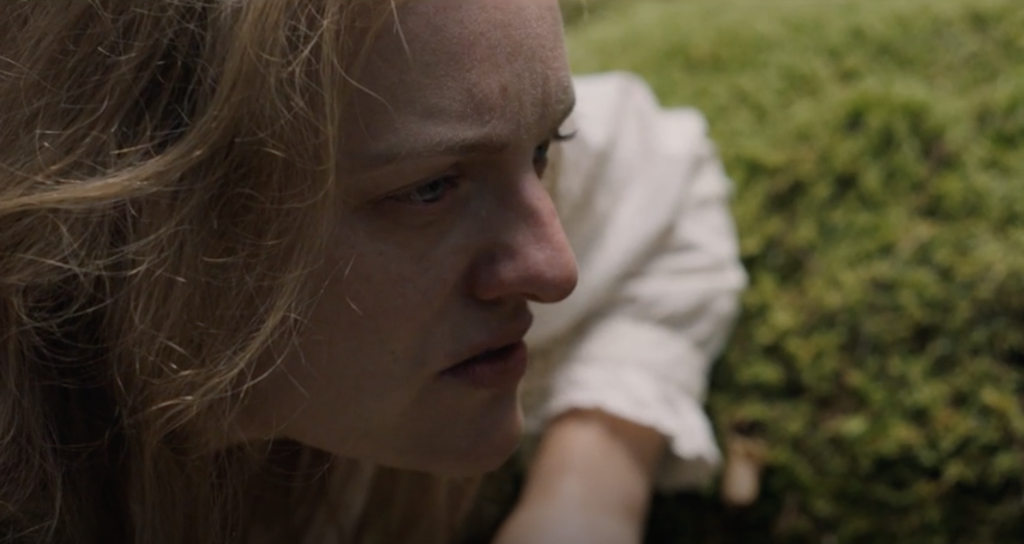
While Jackson did suffer from depression and agoraphobia after writing We Have Always Lived in the Castle, she actually seemed to have been pretty stable while writing Hangsaman. Furthermore, the film treats Hangsaman as though it’s some sort of true crime novel based on the disappearance of Paula Welden. That’s not really true. While Jackson did get some inspiration from the case while writing the novel, she wasn’t utterly obsessed with it as the character of Shirley was in the film. For a while, the movie took on this weird almost detective story tone as Shirley sent Rose to investigate the case. That was kind of jarring and had no basis in reality.
One of the worst parts about this film was that it didn’t involve Jackson’s actual writing when it could have. Throughout the movie, Shirley reads lines from her Hangsaman manuscript. These lines aren’t actual lines from the book. It was really bizarre to hear these made-up quotes when they could have just quoted the novel itself and it would have worked better. This choice I really do not understand. Hangsaman is a great book that perfectly fits the themes of the movie. Why not have Elisabeth Moss read lines from it?
Oh, and this is pure speculation but I’m pretty sure Shirley Jackson didn’t have the X-Men power of guessing when a woman was secretly pregnant.

Final Thoughts
This is a haunting, interesting film. It deals with the dread and horror of women grappling with being forced into a subservient, domestic gender role, mistreated by their husbands but unable to do anything about it. It’s about “lost girls” who live on the margins and disappear. But it is not biographical. I would really hate for people to come out of this movie thinking that it was a completely accurate portrayal of Shirley Jackson’s life. Her story was actually more empowering in reality: she broke free from a bigoted, repressive family, wrote some of the greatest horror fiction of all time, and found joy raising her children even though she had a difficult relationship with her husband. That story, to me, is more powerful than the one portrayed in Shirley, and why I didn’t love the film as much as I wanted to.
 (3.5 / 5)
(3.5 / 5)
You may like
2 Comments
Leave a Reply
Cancel reply
Leave a Reply
This site uses Akismet to reduce spam. Learn how your comment data is processed.
The finale of American Horror Story Delicate aired last night. And if you were watching along with us on Threads, then you already know that it didn’t live up to any of my expectations.
Let’s discuss.
The story
We begin with Anna being ushered off stage and into an ambulance. Dex is there because Siobhan called him.
Once in the ambulance, though, the blood starts to spill. And it’s not just Anna’s. She soon finds herself in the clutches of the coven, giving birth in the most anxiety-inducing place possible. And when the baby is born, he’s taken away at once.
Because that’s the agreement that Anna made, without fully realizing what she was agreeing to.
If Anna’s going to get her baby back, she’s going to have to make another sacrifice. She is going to have to join the coven herself. Is she strong enough to do it? Is she strong enough to raise a monster?
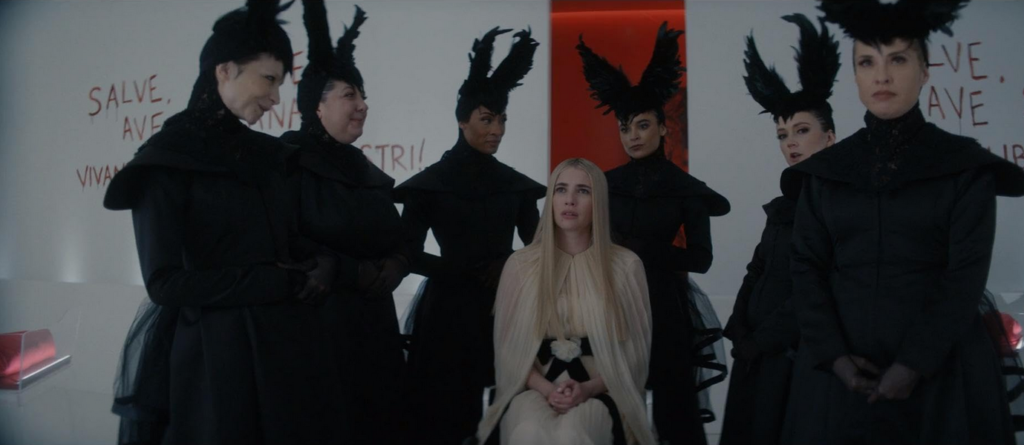
What worked
This episode did have some fun elements. As a practicing witch myself, I appreciate the addition of Hestia in a positive light. Especially when this season was so focused on motherhood, womanhood, and sisterhood, Hestia was a lovely goddess to include.
For those who don’t know, Hestia is a goddess of the home and hearth, but not a maternal goddess. She was, in fact, a virgin goddess. So Adeline’s devotion to her made sense in a real-world witchcraft way. Adeline was supposed to be a symbol of female love and support. Including Hestia in this made that crystal clear.
This was made most clear with the behavior of Siobhan. She was a perfect example of a toxic person who uses sisterhood to use and manipulate others. This can be seen clearly in the flashback that begins this episode. We see Siobhan show kindness to Anna, who she wants to use while being cruel to the woman who shared her story at the start of the meeting. For Siobhan, kindness is a currency she spends to get something. And that is clear.
What didn’t work
Sadly, those two elements weren’t enough to save this episode. My first concern is that this ending had more holes in it than Swiss cheese.
This wasn’t just a matter of having questions left after the ending. These were elements that we should have seen and just didn’t. Why were the witches diluting and working with blood near the end of the episode? Why didn’t Dex Senior get what was coming to him? What the hell was with those pointed green heels? My largest question, however, is this.
Did Anna imagine all of this? Did any of it happen? We don’t know. Consider the ending. I don’t want to spoil too much of this, so I’ll only point out Anna’s gown. It’s bloody in one scene and newly clean the next. This is only the example I can share without spoiling the ending. But we have no proof that any of these things happened to her.
While it’s fine to leave some questions up to the viewer, there were too many here. Rather than feeling mysterious, it just felt incomplete. And seeing as how this episode was much shorter than a standard one, this could have easily been corrected.
I would also like to hold some space for how this season ruined the good message of the book Delicate Condition. This novel was bloody, gory, and disturbing. But it also had a beautiful message about sisterhood, and women supporting women through motherhood, career choices, and life in general. There is so much pure, sisterly love in that book.
This is entirely missing from this season. It’s often turned on its head, with women betraying each other for their own selfish desires. And honestly, I hated that.
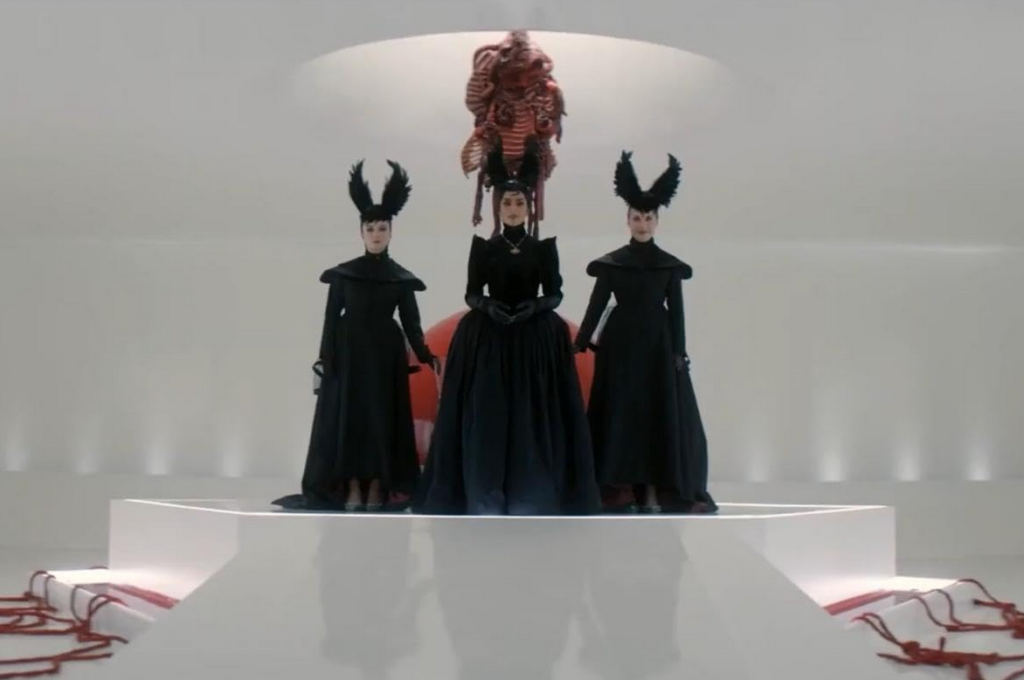
Finally, this season finale is another example of an ending ruining a good season. AHS Delicate wasn’t without its charm. Some episodes were great fun. There were elements that I truly enjoyed as a horror fan, a witch and a woman. But this ending just soured everything good about the season. It spoiled all of the enjoyment I had. Much like Sabrina, Dexter, and the podcast Dolores Roach, the ending ruined everything that came before it.
In the end, this finale was disappointing. It didn’t deliver on its promises, it did a disservice to the source material, and it was poorly executed. This series is more than capable of better. Delicate Condition, the novel, deserved a better interpretation.
However, as a long-time fan, I can honestly say that in twelve years of content, I have genuinely disliked a season and a half of American Horror Story. This one, and the second half of Double Feature. So while AHS Delicate was a disappointment, I am looking forward to season thirteen. In the meantime, I’m going to rewatch Coven and look forward to better stories to come.
 (2 / 5)
(2 / 5)
Episode three of Amazon Prime’s Fallout continued the themes we’ve seen so far, with an added twist. With comedy and gore already blending, the story has added an air of tragic history for one of its least cuddly characters.
Let’s discuss.
The story
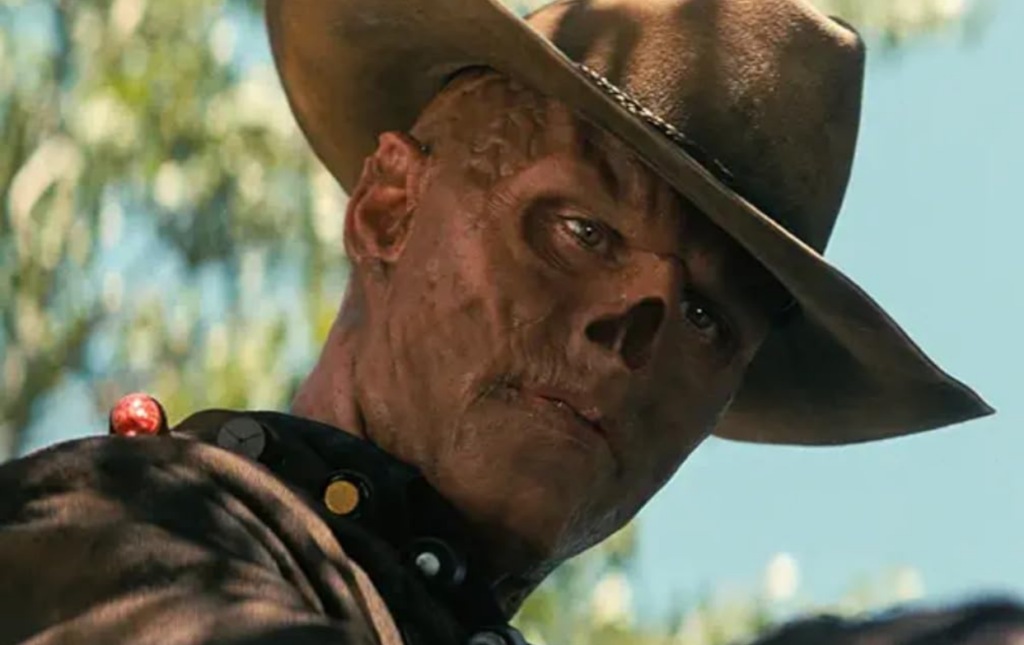
Our story starts with a flashback to before the bombs dropped. We see Coop, filming a movie. His wife is on set as well, and their adorable daughter. Coop has a comfortable life with a family he loves.
Isn’t that just a knife in the heart?
Back in the present, Lucy is traveling through the wastelands with the head of Wilzig. And she’s doing so with the same fear and joy that we’ve seen from her so far. Until that is, she runs into a Gulper. And after eating a defenseless deer, it swallowed up the head.
Eventually, The Ghoul catches up with Lucy and decides to capture her. After using her as bait, he decides to drag her along with him.
Meanwhile, Maximus gets a message from the Brotherhood of Steel. Rather than coming clean, he claims to be Knight Titus and is accidentally sent a new Squire. That squire is Thaddeus, one of Maximus’s bullies from the base. And Maximus wastes no time in taking some sweet, sweet revenge.
Finally, we return to Vault 33. The vault is healing from the Raider attack and the loss of Lucy. Norm and Chet are being punished for letting Lucy leave, by being fired from their jobs. This throws Chet because he had a cool job.
Norm, on the other hand, didn’t like his job. He didn’t like any job. So, since this is the only way anyone gets punishments in the vault, he’s given the task of feeding the Raiders.
And talking to the Raiders was maybe not a healthy thing for Norm to be doing. He might learn something he didn’t want to know.
What worked
The first thing I have to talk about is the massive creature called The Gulper.
This thing was fascinating. It was voracious, fast, and horrifying to look like. It was like a giant axolotl from Hell, with human fingers lining its whole mouth and throat. Why did it need fingers lining its mouth and throat? The better to drag someone down its throat and into its stomach. And the better to drag itself into my nightmares. This creature was well done.
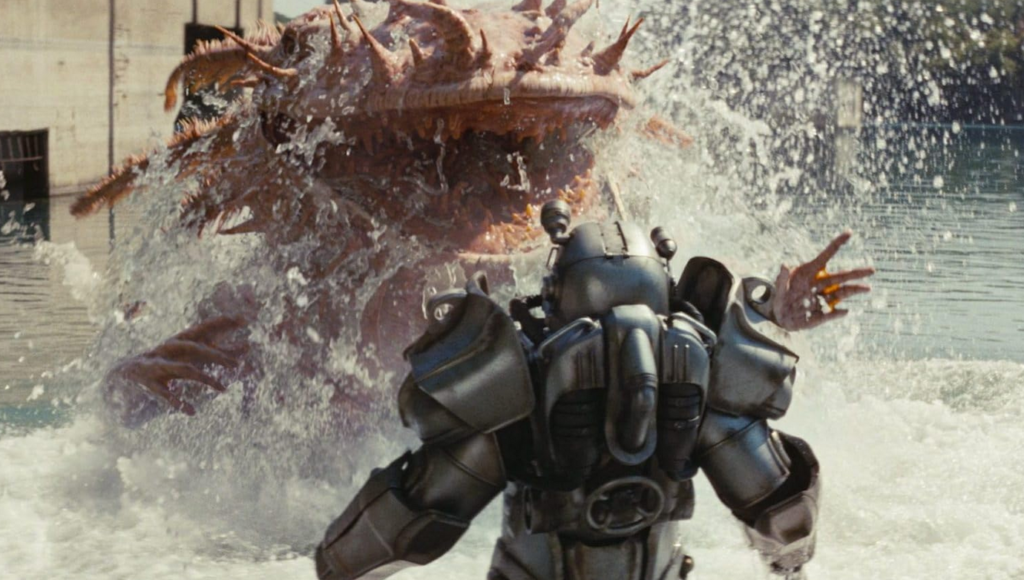
On the flip side of this, I love the fact that the people of Vault 33 are so kind. They’re so willing to forgive, willing to care for their fellow man even when their fellow man is trying to kill them.
I don’t trust it, to be clear. But the perceived kindness from these people is uplifting. And I’m sure it will make whatever is going to eventually happen to them all the worse.
Of course, I can’t talk about the goodness of the vault dwellers without talking about the absolute horribleness of The Ghoul. The Ghoul is not a good person. He is cruel, and selfish, and clearly dislikes Lucy for some reason we do not yet know, and is probably not her fault.
But we kind of understand how he got that way, don’t we? During the flashbacks, we see that he’s lost his wife and daughter. We also see that he was used as a mascot for the very company that created the vaults. And, while we don’t have any concrete proof yet, we can probably guess that these are not the good guys. Even if we haven’t played the games, anyone who’s even slightly genre-savvy can already guess that.
Which is the last thing I want to bring up here.
We know something stinks with the vaults. Something beyond the obvious issues of wealth disparities and the people left outside to die while those who could afford a Vault spot were saved. Something is rotten with the vaults, we all know this. What we don’t know is what form this rot will take.
Not yet.
What didn’t work
Now, I wish I could say this was a perfect episode. But sadly, it wasn’t. And my biggest issue with the episode is with the character Maximus.
Now, I love Maximus. He wants to do good things in the world. He’s the underdog, and who doesn’t love that? He’s honorable and believes in the organization he belongs to.
I don’t love that he cannot do anything right. It feels like he wins fights by falling over and tripping into succeeding. And this character deserves so much more than that. Can we please, just once, see him be good at something or make a sound decision?
All that being said, this was still a fun episode. It was funny and bright, with an ominous feel and a horrific finger-ridden monster. I had a great time with it.
 (4 / 5)
(4 / 5)
Last night’s episode of American Horror Story Delicate was wild. From its star-studded start to its powerfully quiet finish, I was enthralled through every moment.
Let’s discuss.
The story
We begin this episode at the funeral of Dex’s mom. While he’s giving a eulogy, which was very nice, Ms. Preecher walks in. She shouts to the room that Virginia didn’t commit suicide, she was murdered. She also tells Dex to listen to his wife.
What a concept!
Touched by this, or maybe just curious, Anna goes to the hospital to check on Preecher. She falls asleep at the hospital. When she wakes up, Preecher is gone. A nurse says that she was discharged to a group of women.
While at the hospital, Anna also discovers that she’s been nominated for best actress.
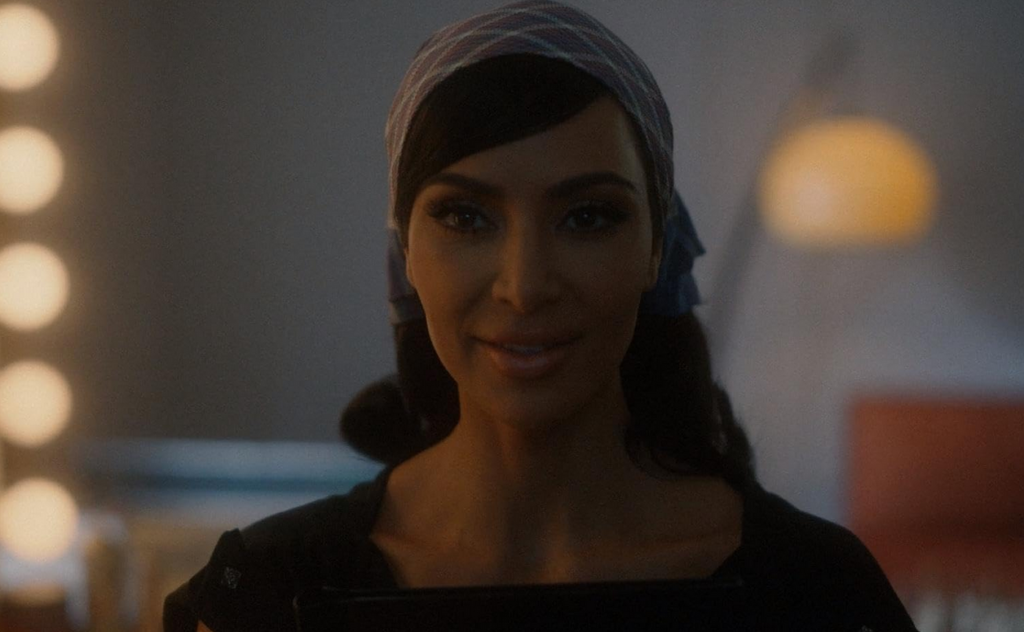
At a publicity event for the awards, Anna runs into Cora. And she sees the coat she remembers from her late-night visit near the start of her pregnancy.
With the slightest amount of pressure, Cora spills it all. She and Dex have been having an affair, and Cora was trying to sabotage Anna’s pregnancy. So Anna, channeling her inner Madison Montgomery, kicks him out and heads to the awards ceremony with Siobhan.
There, Siobhan asks her if she wants an Oscar more than anything. If she’d be willing to give up anything for it.
And Anna says yes.
The bargain is then sealed with a kiss.
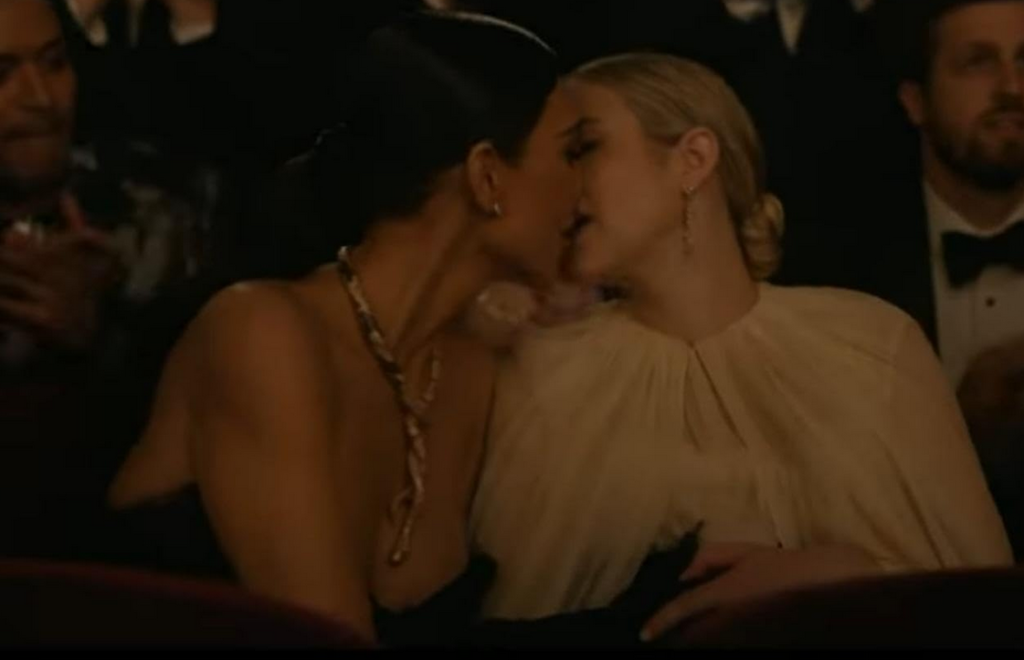
What worked
I’d like to begin, paradoxically, at the end of the episode. We’ve seen Anna have some terrible, loud, frightening hallucinations in this season. At least, we assume they’re hallucinations. But this one wasn’t loud. It was, in fact, very quiet. Anna is led off stage, without a word, leaving nothing but a puddle of blood behind.
In horror, like in all art, the notes you don’t play are as important as the ones you do. And the notes that weren’t played her rang like a bell.
I also appreciated that this episode describes why being a celebrity would be a huge pain in the ass. Imagine going to an event where the whole purpose is for people to take pictures of you while holding their product. Imagine if they invaded your personal space, sprayed things on you, put things over your eyes, and you were expected to smile and pose.
I don’t know what it is about being a celebrity that makes others feel entitled to a person. To talk with them, take their time, and share in their moments. To touch them without consent. Yes, there are way worse things happening to people. But this isn’t a great way to live. It’s no wonder so many of them go nuts. This is most clearly shown in the scene when Anna is sitting next to Preecher’s bed. She wakes up to find the older woman gone. But all anyone wants to talk about is how she was just nominated for an Oscar. At that moment, she doesn’t give a damn. She cares about this kind woman, and where she’s gone. Just like any other person.
Finally, I appreciated that this season didn’t do what so many AHS seasons do. Which is to say that this episode didn’t feel like the last episode. It felt like the penultimate episode. It felt like there was still more story to tell, not just loose ends to be wrapped up. I appreciate that the writers have finally learned that lesson.
For this season, at least.
What didn’t work
The first thing that bothered me in this episode was Cora’s confession. I said something about this during our live-watch event on Threads. (Join us next week for the finale. Bring popcorn and wine.)
I don’t believe Cora’s confession. I further don’t believe that she just dumped all of this incriminating info on Anna with no more prompting than a wide-eyed look. There was just no reason for it. So, Anna saw her coat? Lots of people have similar coats. This feels fake, and she brought no receipts.
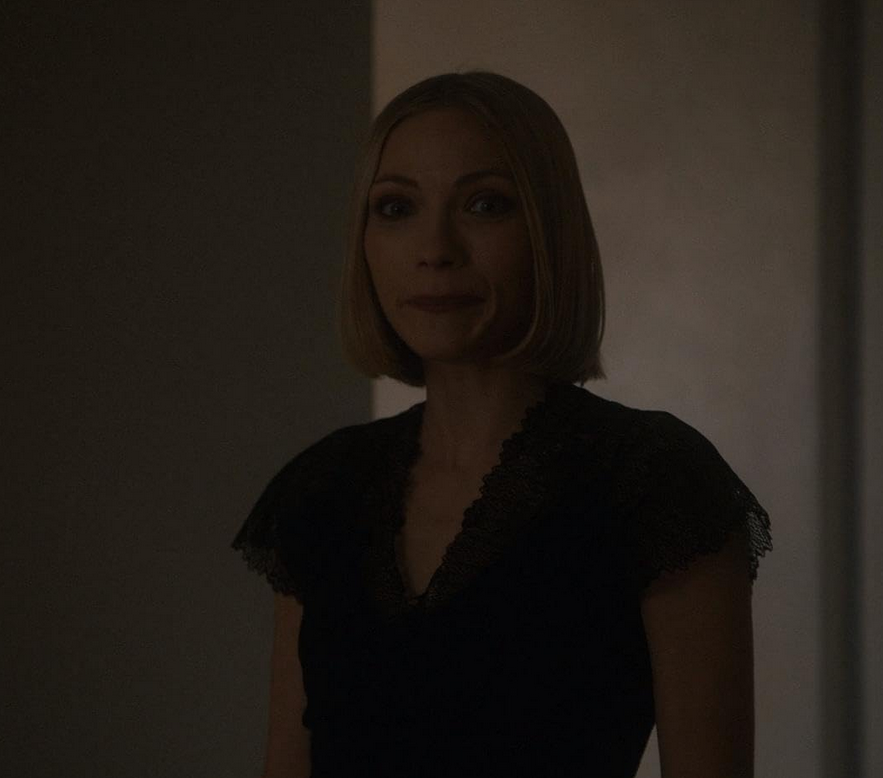
I also found Siobhan’s behavior confusing. At times she seems genuinely concerned for Anna’s wellbeing. At other times, she is more than willing to let her suffer and risk her pregnancy.
While this has been going on all season, it was happening every few minutes in this one. Either Siobhan cares about the welfare of that fetus, or she doesn’t. But she needs to pick a lane.
All in all, I don’t know what to expect from next week’s season finale. Anna has her Oscar, but now she might lose her baby. She might also get sucked into some horrible cult and experience a bad death. We won’t know until next week.
See you then.
 (4 / 5)
(4 / 5)




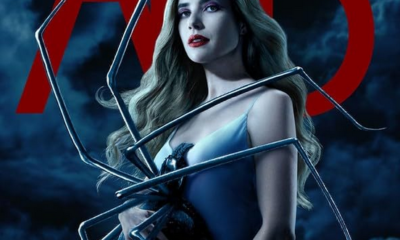





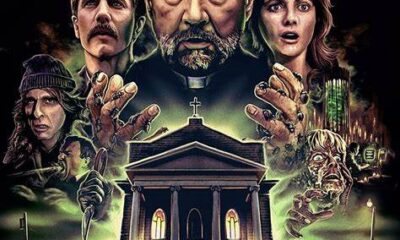

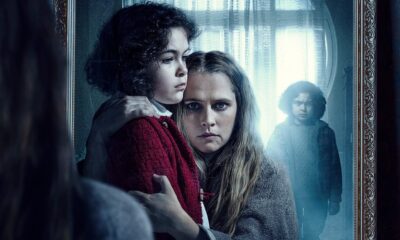



Brianna Schullo
July 9, 2020 at 4:53 pm
This is an excellent and thorough review! I really enjoyed Shirley too, but was unsure of the authenticity. Thanks for teaching me even more about Shirley Jackson’s real life!
Kristin Cleaves
July 9, 2020 at 7:04 pm
Excellent analysis and facts about Jackson’s real life. Thanks for pointing out the differences!